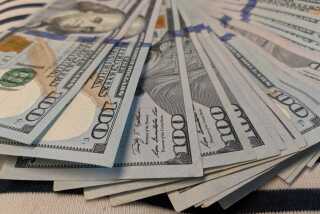Q & A: Stronger Yen Fraught With Economic Risks on Both Sides
- Share via
The yen closed at 99.93 to the dollar in Tokyo on Monday, the first time the U.S. currency’s value has closed below 100 yen since the modern exchange rate system was established half a century ago. The dollar later rallied in New York back above the 100 level, but it is clear that the yen has enjoyed a record rise against the greenback.
Here are some questions and answers about the yen’s strength against the dollar and its potential effects.
*
Q: Why has the yen been rising against the dollar?
A: There is no single reason, but much of the yen’s most recent strength has derived from Japan’s enormous trade surplus with the United States. The inability of Japan and the United States to agree on ways to reduce the surplus has led the global foreign exchange market to conclude that a more expensive yen--in other words, a cheaper dollar--is inevitable.
*
Q: How would a cheaper dollar help shrink Japan’s trade surplus?
A: Theoretically, it means Japanese goods become more expensive in the United States because more dollars are needed to buy them, even though their value in yen terms hasn’t changed.
This is one reason why imported Japanese cars have gotten more expensive in the last few years. Conversely, it takes fewer yen to buy the same American goods in Japan--making them more affordable. The net result is that Japan’s trade surplus begins to shrink.
*
Q: Then why does the surplus remain so high?
A: There are a few reasons. It takes time for currency exchange rates to have an effect on trade flows. American exporters are only beginning to make significant cracks in Japan’s insulated markets. Many Japanese exporters, attempting to keep their prices from rising sharply in the United States, have absorbed the blow of the stronger yen through lower profits. Others have moved their manufacturing operations to the United States, partly to bypass the exchange rate problem.
*
Q: What are the risks of a higher yen and cheaper dollar?
A: For Japan, the risks are lower profits and sales for Japanese exporters, which could threaten the nation’s recovery from its worst economic downturn since World War II. Moreover, if the Japanese economy stays in recession, consumers could be less inclined to buy imported products, even though those products become cheaper with the yen’s rise.
For the United States, a cheaper dollar discourages foreigners from investing in U.S. stocks and bonds. That has jolted Wall Street and could ultimately lead to significantly higher U.S. interest rates. That would help the dollar but make the cost of borrowing more expensive for American consumers and inevitably slow the U.S. economy.
*
Q: With those considerable risks, what are Japan, the United States and other countries doing about it?
A: On Friday, the United States led a multinational effort by central banks to slow the dollar’s fall by purchasing dollars on the foreign exchange market, which reduced the supply. But the dollar fell anyway, signaling a deep-seated belief by global money traders that the U.S. currency is likely to weaken in coming weeks and months.
In Japan, there is some belief that Japan’s central bank will lower interest rates. That would make yen-denominated investments less valuable and theoretically could cause the yen to weaken against the dollar. But lower interest rates can also hurt Japan by shifting investment to other countries where rates are higher.
More to Read
Inside the business of entertainment
The Wide Shot brings you news, analysis and insights on everything from streaming wars to production — and what it all means for the future.
You may occasionally receive promotional content from the Los Angeles Times.










